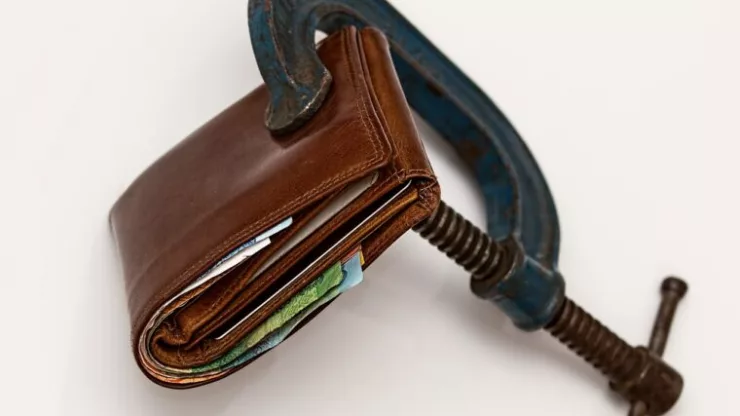Recessions are an unavoidable part of the economic cycle. Although it’s difficult to predict when one will occur, it’s essential to be prepared.
In this article, we’ll discuss effective strategies and tips to safeguard your financial future during a downturn.
We’ll also answer some frequently asked questions related to recession preparation.
Build an Emergency Fund
Having an emergency fund is crucial for financial stability during a recession.
This fund should cover at least three to six months of living expenses.
It will help you manage unexpected expenses and avoid taking on debt during tough times.
Start by setting aside a small portion of your income each month. Aim to gradually increase the amount you save.
To make saving easier, consider automating your savings or using a separate high-yield savings account.
Pay Off High-Interest Debt
Reducing debt, especially high-interest debt, is an essential step in preparing for a recession. High-interest debt can amplify the financial strain during an economic downturn.
Prioritize paying off credit cards, personal loans, and other high-interest debt.
Consider using strategies like the debt snowball or debt avalanche methods to tackle your debt more effectively.
Diversify Your Investments
Diversifying your investment portfolio can help protect your assets during a recession. A well-diversified portfolio should include a mix of stocks, bonds, and other investment vehicles.
Consider working with a financial advisor or using a robo-advisor to build a diversified portfolio tailored to your risk tolerance and financial goals.
Don’t forget to periodically rebalance your portfolio to maintain the desired level of diversification.
Increase Your Income Streams
Having multiple sources of income can provide a safety net during a recession.
Look for opportunities to earn extra income, such as freelance work, part-time jobs, or passive income streams like rental properties or dividend stocks.
Consider investing in yourself by learning new skills or obtaining certifications that can boost your earning potential.
Create a Budget and Cut Expenses
Developing a budget can help you track your spending and identify areas where you can cut expenses.
By reducing unnecessary expenditures, you can free up more money to save or invest.
Consider using budgeting apps or tools to make the process easier. Remember to reevaluate your budget regularly and adjust as needed.
Stay Informed
Keep up-to-date with the latest economic news and trends to make informed decisions. Stay informed about the current state of the economy, interest rates, and job market trends.
Subscribe to reputable news sources or financial newsletters to stay current on economic developments.
You can also join online forums or follow financial influencers on social media to stay connected with the latest information.
Conclusion
Preparing for a recession involves taking proactive steps to safeguard your financial future.
By building an emergency fund, paying off high-interest debt, diversifying investments, increasing income streams, creating a budget, and staying informed, you can navigate economic downturns with greater confidence and resilience.
Remember that while recessions are inevitable, they are also temporary. By being prepared, you can weather the storm and emerge stronger on the other side.
How to Prepare For a Recession FAQs
What are the common signs of an upcoming recession?
Certain indicators often precede an impending recession.
These indicators encompass elevated unemployment rates, a decline in consumer confidence, decreased business investments, an inverted yield curve, and a reduction in GDP growth.
It is important to note that accurately predicting the precise timing of a recession is challenging, and these signs are not infallible.
How long do recessions typically last?
Recessions can vary in length, but they typically last between 6 to 18 months. The duration of a recession depends on several factors, such as the severity of the economic downturn and the effectiveness of government policies and interventions.
Is it a good idea to invest during a recession?
Investing during a recession can present opportunities for long-term investors, as asset prices are often lower.
However, it’s essential to maintain a diversified portfolio and invest according to your risk tolerance and financial goals.
It’s also crucial to have a long-term investment horizon and be prepared for potential short-term market volatility.
How can I protect my job during a recession?
During a recession, it is crucial to employ various strategies to safeguard your job.
First and foremost, concentrate on enhancing your job performance and productivity, which can contribute to your overall value within the organization.
Additionally, continuously upgrading your skills and staying up-to-date with industry trends will position you as a valuable asset.
Building a strong network of contacts within your organization and industry can open doors to new opportunities and collaborations.
Furthermore, showcasing your value by willingly taking on additional responsibilities or leadership roles can demonstrate your commitment and dedication.
Lastly, being proactive in suggesting cost-saving measures or proposing innovative ideas to increase revenue for your employer can exhibit your problem-solving skills and contribute to the company’s stability.
By adopting these strategies, you can better protect your job during challenging economic times.
Should I sell my stocks during a recession?
Selling stocks during a recession may not be the best strategy for long-term investors, as market downturns can be temporary.
It’s essential to maintain a diversified portfolio and avoid making emotional decisions based on short-term market fluctuations.
Instead, focus on your long-term financial goals and investment strategy.
Is it a good time to buy a house during a recession?
A recession may present opportunities for homebuyers due to lower interest rates and reduced home prices.
However, it’s essential to consider your financial stability and job security before making a significant investment like purchasing a house.
Make sure you have a solid emergency fund and can comfortably afford the mortgage payments.
How can I prepare my business for a recession?
In anticipation of a recession, it is important to implement strategies that can effectively prepare your business.
Start by developing a comprehensive contingency plan that incorporates cost-saving measures and identifies potential revenue sources to mitigate financial challenges.
To safeguard against economic uncertainties, bolster your cash reserves to provide a financial cushion.
Furthermore, diversify your customer base and revenue streams to minimize reliance on a single market or sector.
Stay vigilant and monitor industry and market trends closely, allowing you to adapt your business strategy promptly and remain competitive.
Lastly, consider investing in technology and streamlining processes to enhance efficiency and reduce costs.
By proactively adopting these strategies, you can better position your business to navigate the potential challenges of a recession.

I am a fun fact enthusiast and creator of Facts On Tap.
I love to share my knowledge and curiosity with readers and inspire them to learn something new every day.
When I’m not writing, I enjoy traveling, reading, and playing trivia games with my friends.




